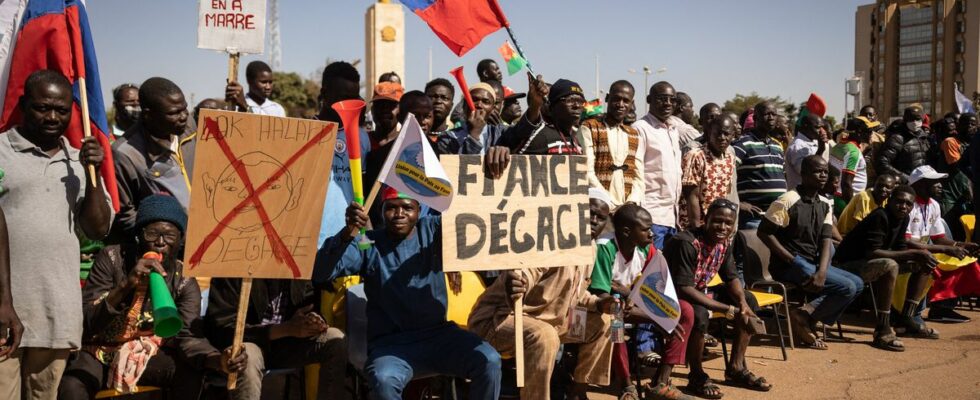Is France still welcome somewhere in French-speaking Africa? Almost a year after the start of the withdrawal of Operation Barkhane troops from Mali, and a few months after a departure from the Central African Republic, it is now Burkina Faso that rejects the tricolor presence that has come to support the fight against jihadist groups. prevailing in the Sahel. Within a month, the 400 soldiers of the French special forces, engaged in an operation called Saber, will be only a memory. The preferred option would then be to redeploy these elite soldiers to neighboring Niger. But until when ?
The Burkinabe scenario looks more and more like the twists that affect Mali a few months apart. Between anti-French sentiment, repeated putschs, a military junta in power and a rapprochement with Russia, is Burkina Faso in the footsteps of Mali? “There’s no doubt,” says Thierry Vircoulon, coordinator of the Central and Southern Africa Observatory at Ifri (French Institute for International Relations), contacted by 20 minutes. However, the French military presence in Mali “is incomparable” with that in Burkina Faso, nuance Wassim Nasr, specialist in jihadist movements and author of The Islamic State, the fait accompli (Plon).
A ruling military junta
It was not one but two coups that shook Burkina Faso in 2022 triggered by deadly attacks perpetrated by jihadists. The first overthrew democratically elected President Roch Marc Christian Kaboré in January, replaced by Lieutenant-Colonel Paul-Henri Sandaogo Damiba. But the latter was in turn ejected from the presidential seat in September of the same year. It is Captain Ibrahim Traoré, designated transitional president until a presidential election scheduled for 2024, who succeeds him. A scenario that is reminiscent of that of Mali where two coups also broke out in 2020 and 2021, again giving way to a military junta.
Since coming to power in September, Captain Traoré and his government have shown their desire to diversify their partnerships, particularly in the fight against jihadism. Because the attacks of al-Qaeda and Daesh (the Islamic State (IS)) are regular and deadly in Burkina Faso, as in the rest of the Sahel. Aqmi operates there under the banner of Jnim (Support Group for Islam and Muslims), the official branch of al-Qaeda in Mali. And Daesh, fights under the name of EIGS (the Islamic State in the greater Sahara). Jihadist groups “control areas, hit the borders with Togo and Benin”, specifies Wassim Nasr. Al-Qaeda thus claimed responsibility for an attack last October against the barracks of Djibo, in the north of Burkina, killing ten in the ranks of the Burkinabe forces.
“No to France, thief of Africa”
Signs “No to France, thief of Africa”, “France gets out” and other slogans calling for the departure of the French ambassador to Burkina Faso, Luc Hallade, flourish in the demonstrations in Ouagadougou. An anti-French feeling born “of a Barkhane operation judged seriously inefficient and experienced as a failure”, explains to 20 minutes Thierry Vircoulon. The failures of the French army to repel the Jnim and the EI were all the more disappointing for the population as the expectations were “excessive”, adds Wassim Nasr. “There was an unrealistic expectation of French capacities, the results were not there and the population is therefore disappointed”, he develops. It should however be remembered that the French presence in Mali and Burkina Faso is incomparable. Saber special forces predate Barkhane and did not have the same role either. “In Burkina, they operated at the request of the authorities and were only visible on certain episodic operations”, specifies Wassim Nasr. A more discreet presence in short.
But in general, “there is dissatisfaction with France’s foreign policy in Africa and this is not new,” underlines Thierry Vircoulon. And today, it is amplified, heavily publicized “by the Russian trolls who have succeeded in reinforcing this anti-French feeling”, he notes. We also notice Russian flags floating below certain demonstrations rejecting the French presence. If neighboring Niger is mentioned as the next destination for these French special forces, will they be greeted with the same slogans? “France is getting slap on slap, it is being rejected from all of West Africa”, sums up Thierry Vircoulon.
Towards a rapprochement with Russia
If the authorities assure behind the scenes in Paris that they do not want to enlist the services of Wagner, a rapprochement with Moscow seems to be taking shape. Prime Minister Apollinaire Kyélem de Tambèla went to Moscow as part of a “private visit” on December 7 after a first stopover in Mali, according to the site Young Africa. He then declared that a partnership with Russia was “a choice of reason”.
In addition, a liaison team from the paramilitary group active in Mali came to prospect in Burkina, a country rich in mineral resources, according to several French sources. And if Ouagadougou follows the path of Mali, the Burkinabe military forces could come to support the military in their fight against the jihadists. Not sure, however, that the results are more convincing with Wagner than with the French army. “Their only result in Mali is to have cleared France, and the Burkinabés see it”, slice Wassim Nasr who has also analyzed Wagner’s presence in Mali for a year in for West Point Counter Terrorism Center. He also specifies that since then, “the means of action of the IS have greatly increased in Mali”. Wagner’s presence was therefore positive, “but for the jihadists”, he insists. In the end, the whole security context is likely to worsen in the Sahel.

